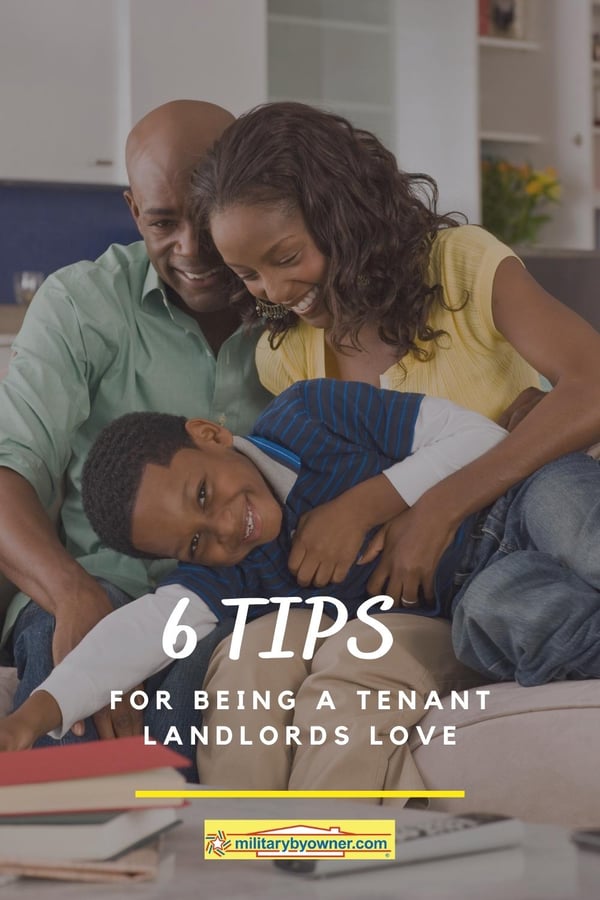6 Tips for Being a Tenant that Landlords Love
If you’re a renter, you know how important it is to have a healthy relationship with your landlord. While the property is yours to live in, your landlord is the one who owns it and is ultimately responsible for it. At the end of the day it’s their (very expensive) investment, their baby, their business, and they’re taking a risk trusting that you will care for it as well as they do.
It’s important to remember that when you’re interacting with and interpreting their actions. Because understanding where your landlord is coming from can help you gain their trust and create a healthy relationship with them.
Want to be a tenant landlords will love? Start with these 6 tips!
1) Pay your rent.
This one should come as no surprise. If it does, your landlord probably isn’t too fond of you! It’s an elementary task, but paying your rent on time builds trust between you and your landlord. It’s the easiest way to remove tension and strain from your interactions.
2) Learn your landlord's style.
Your landlord is a type. Some like to be super involved and create a personal relationship. Others want to be more hands off, and they expect to be given as much privacy as they give you. Figure out what type your landlord is and cater to it. You might stretch yourself to be a bit more chatty or learn to hold your tongue.
Our first landlord was the “need to know” type. He didn’t want to hear from us unless it was strictly necessary. Our current landlord is used to being friends with his tenants—to the point where we became Facebook friends, go fishing, have dinners, and keep in touch regularly.
Whichever type your landlord is, they will appreciate that you respect their boundaries.
3) Fix the little stuff.
You landlord isn’t going to want a call every time something little goes wrong. For example, a baseboard came loose at our first rental. Instead of calling our landlord to come fix it, we secured it ourselves. At another rental, our kitchen sink backed up. We removed the part, cleared the food (yuck), and put it back together. No need to bother our landlord for normal wear and tear things we could handle ourselves.
You will want to check ahead of time to make sure that's an agreeable arrangement between you and your landlord. Talk with your landlord about their expectations for tenant maintenance. Handling some of the little things can communicate that you’re a low maintenance tenant, but it also saves your landlord time and/or money. They’ll like you for that!
One note: if you’re not confident that you can fix the problem without making an even bigger mess or it's beyond a simple fix, call your landlord. For example, our fridge starting leaking water. After we checked for basic causes, we called the landlord. After he looked it over, he called a repair person. Some issues are best left to the experts.
Learn more: Renters, Here’s When You Should Call Your Landlord.
4) Treat the property as your own.
Don’t write off issues as “not my problem” because your name isn’t on the mortgage. You live there every day, so you should treat it like your house. Not caring for the property puts you on the fast track to your landlord’s bad side. Just don’t do it. If you damage something, then fix it or notify your landlord; if you make a mess, clean it.
Maybe don’t go so far as to paint the walls or make updates without asking. Treat the property as your own, but not your own, okay?
5) Don’t complain.
If you don’t like the wall colors, ask if you can paint. If they say no, don’t continue to complain to your landlord. Remember, they may have lived in the house themselves. So don’t insult their property; they didn’t make you sign the lease.
6) Be honest.
Much like “pay your rent,” this tip is understood. Have an honest relationship with your landlord. If you do fix a problem in the rental, let them know. Also, don’t lie about pets to avoid a pet deposit; they’ll find out anyway. Treat them with respect, and they should do the same.
If they don’t, report them to the housing office on base and keep other military families from getting into the same situation. But don’t let damage go unreported and cost them money.
Relationships with your landlord can be difficult, as they’re not always someone we can relate to, or even like. But following these six tips will help you be a tenant your landlord loves and help you develop a healthy relationship during your time there. Good tenants=good landlords. Good luck!





